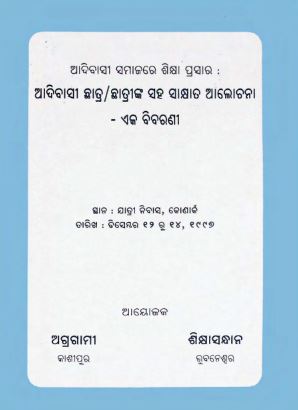Education is a fundamental human right that should be accessible to all individuals, regardless of their socio-economic background or cultural identity. However, the reality is that many indigenous communities across the world face challenges in accessing quality education that is culturally relevant and sensitive to their needs. The book “Adibasi Chhatra-Chhatrinka Saha Alochana” by Agragamee, published in 1997, sheds light on the issues faced by indigenous students and offers solutions to improve their educational experiences.
One of the main problems identified in the book is the lack of representation of indigenous cultures and histories in the mainstream education system. Indigenous students often find it difficult to relate to the curriculum and materials taught in schools, as they do not reflect their own cultural perspectives and experiences. This can lead to feelings of alienation and a disconnection from the learning process.
Furthermore, many indigenous students face discrimination and marginalization in educational settings, which can negatively impact their academic performance and self-esteem. They often lack access to resources and support systems that are necessary for their success, such as qualified teachers who understand their cultural background and language.
In response to these challenges, the book “Adibasi Chhatra-Chhatrinka Saha Alochana” advocates for a more inclusive and culturally sensitive approach to education for indigenous students. It calls for the integration of indigenous knowledge and perspectives into the curriculum, as well as the recruitment of indigenous teachers and staff who can serve as role models and mentors for students.
Additionally, the book emphasizes the importance of creating safe and welcoming learning environments for indigenous students, where they can feel empowered to express their cultural identities and participate fully in the educational process. This includes providing opportunities for students to learn about their own histories and traditions, as well as promoting respect and understanding among all members of the school community.
The book also highlights the need for collaboration and dialogue between teachers, students, parents, and community members to address the unique needs of indigenous students and create solutions that are culturally relevant and effective. By working together, stakeholders can develop strategies to improve educational outcomes for indigenous students and promote their overall well-being.
In conclusion, “Adibasi Chhatra-Chhatrinka Saha Alochana” is a valuable resource for educators, policymakers, and community members who are committed to improving the educational experiences of indigenous students. By raising awareness of the challenges faced by these students and offering practical solutions, the book serves as a catalyst for positive change in the education system. It is essential that we continue to prioritize the needs of indigenous communities in education and work towards creating a more inclusive and equitable learning environment for all students.
Books Info
| Books name | Adibasi Chhatra-Chhatrinka Saha Alochana |
| Editor | Agragamee |
| No Of pages | 32 |
| Publisher | Shikshya Sandhana |
| Publication | 1997 |
| Printed At | Shovan |
| Distributor | NA |

